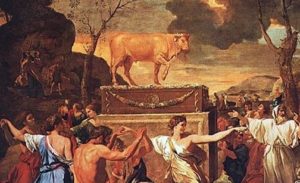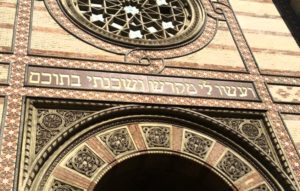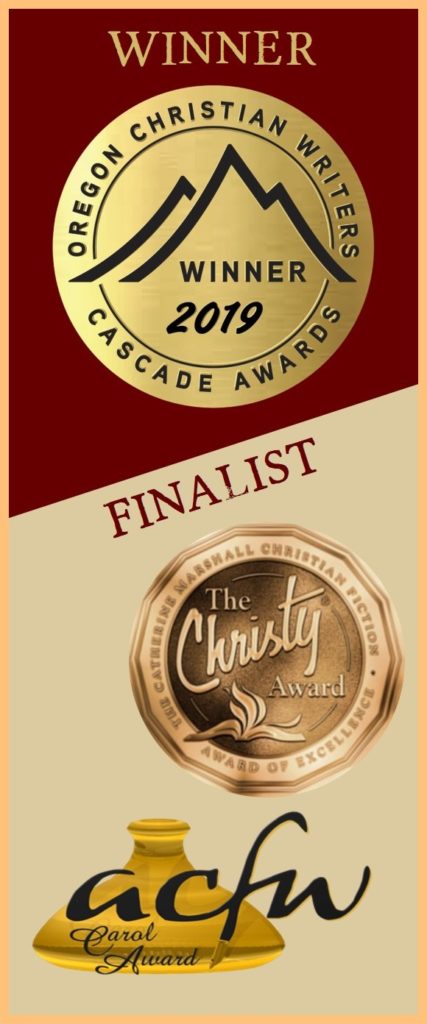When God’s Love Comes Down

A God who yearns to walk our deserts with us.
How many ways has He pleaded for our hearts?
The Tabernacle shows us a God Who Never. Stops. Redeeming.
Four things to love about this story.
This weekend, the Jewish people observe Rosh Chodashim, the first day of the Biblical year. If you’ve been with me for a while you know I have a fascination with the Hebrew calendar!
Check this out: this first month of the Biblical year is sometimes called Chodesh Ha-yeshuah, the month of deliverance, as it features the feasts of Passover, First Fruits and Unleavened Bread which commemorate the redemption of the Jewish people from their Egyptian bondage.
Of course, followers of our Savior Yeshua know this “month of Yeshua” also gave us a whole new level of redemption, from bondage to sin and death, since “indeed Christ, our Passover, was sacrificed for us. Therefore let us keep the feast…” (1 Cor 5:7-8).
You will certainly hear more from me on that subject! But today, I’d like to talk about an event that happened on Rosh Chodashim specifically. On Israel’s first Rosh Chodashim in the desert.
Then the Lord spoke to Moses, saying: “On the first day of the first month you shall set up the tabernacle of the tent of meeting.” (Ex 40:1-2)
The story of the Tabernacle’s construction really speaks to me. It’s one more example in which God moves mightily to restore His wayward people. And the Tabernacle itself provides a beautiful picture of our Lord’s ministry.
The Tabernacle’s Story in a Nutshell
And let them make Me a sanctuary, that I may dwell among them. (Ex 25:8)
If you’re not familiar with the Tabernacle, it was a sort of portable Temple God had His people build while they wandered in the desert.
 Tabernacle reconstructed
Tabernacle reconstructed
at Timna Park, Israel
Let me try to paint the backstory quickly. After God’s people witnessed His glory as He redeemed them from Egypt “with a mighty hand and an outstretched arm” (Deut 4:34) After He guided them through the desert via cloud and fire. After He descended on Mount Sinai in smoke and fire and the ground quaked at the sound of Him. After all this, the day came when the Moses read the Ten Commandments and the book of the covenant to them as they stood “at a distance” from Sinai, too awed to even approach.
And they said, “All that the Lord has said we will do, and be obedient.” (Ex 24:7)
With the covenant agreed to, the Lord called Moses up Sinai for forty days of advanced training. During which He laid out a detailed vision for the Tabernacle.
And let them make Me a sanctuary, that I may dwell among them. According to all that I show you, that is, the pattern of the tabernacle and the pattern of all its furnishings, just so you shall make it. (Ex 25:8-9)
The specifications for the Tabernacle go on for chapters. The gold, the silver, the bronze, the precious gems. The fine linen in regal colors. The animal skins. The golden vessels, the priestly garments, the detailed rituals for sanctification and atonement. The altars and the laver and the curtains and the courts. All of it has a single purpose. “That I may dwell among them.”
 Implements crafted for Temple worship,
Implements crafted for Temple worship,
“That I may dwell among them.”
But… there was a problem. Even as the Lord unfolded His magnificent plan for the Tabernacle, in all its grace and glory, to Moses at the top of Sinai, all hell was breaking loose below.
…The people gathered together to Aaron, and said to him, “Come, make us gods that shall go before us; for as for this Moses, the man who brought us up out of the land of Egypt, we do not know what has become of him.”
And Aaron said to them, “Break off the golden earrings which are in the ears of your wives, your sons, and your daughters, and bring them to me.”
So all the people broke off the golden earrings which were in their ears, and brought them to Aaron. 4 And he received the gold from their hand, and he fashioned it with an engraving tool, and made a molded calf. Then they said, “This is your god, O Israel, that brought you out of the land of Egypt!”… (Ex 32:1-4,6)
Schwaa?? These were the redeemed of the Lord! He’d been sustaining and guiding them in the wilderness for a year! They’d signed up to the whole deal, including the very first commandment:
I am the Lord your God, who brought you out of the land of Egypt, out of the house of bondage. You shall have no other gods before Me. You shall not make for yourself a carved image… (Ex 20:2-4)
Moses had even sprinkled them with blood to ratify it. How could things have gone so far south, so fast? What were they thinking?

But every time I start to get flabbergasted over that, the Lord gently reminds me… They are me. Okay, I may not have witnessed the pillar of fire or tasted the manna in the wilderness, but I have something they didn’t–God’s law written on my heart (Jer 31:33). And in spite of His daily miracles in my own life, I have betrayed Him often and deeply. What was I thinking?
And so we come to one of Scripture’s darkest moments.
“…for I will not go up in your midst, lest I consume you on the way, for you are a stiff-necked people.”
And when the people heard this bad news, they mourned… (Ex 33:3-4)
From here on, there was a tragic schism. While it seems the people’s repentance at this point was sincere, Moses had to meet with the Lord “outside the camp, far from the camp.” (Ex 33:7) The Lord couldn’t dwell in the midst of a people soiled with idolatry.
In a pivotal passage, Moses made a special request of God. “Please, show me your glory.” (Ex 33:18) God invited him back up the mountain and revealed Himself, proclaiming His name as:
“The Lord, the Lord God, merciful and gracious, longsuffering, and abounding in goodness and truth, keeping mercy for thousands, forgiving iniquity and transgression and sin, by no means clearing the guilty, visiting the iniquity of the fathers upon the children and the children’s children to the third and the fourth generation.” (Ex 34:6-7)
Our merciful, gracious and longsuffering God also heard Moses’ supplication, and agreed to “go among” His “stiff-necked people” again. Moses came down the mountain with a second set of tablets, his face literally aglow with this wonderful news. (Ex 34:30)
All of which brought the need to build the Tabernacle–“that I may dwell among them”–to the forefront. Construction began immediately.
Here are four things I love about this story.
The First Thing I Love: A Grassroots Effort
And the first thing I love about this is that, unlike Solomon’s grand Temple in Jerusalem, the Tabernacle in the wilderness was a grassroots effort. It began with a freewill contribution from all who were “willing of heart” (Ex 35:5). And the people brought so much that Moses ultimately had to restrain them from bringing more (Ex 36:5-6)!
The Next Thing I Love: The Tabernacle’s Master Craftsman
Here’s the next thing I love about this. (These aren’t in rank order, BTW. I’m saving the best for last 🙂 ) Do you know who was the first person described by the Bible as being filled with God’s spirit? Ever hear of Bezalel?
No? If not you’re not alone. Umm, yeah…. His is not one of the best-known names in the Hebrew Scriptures.
We first learn of him in Ex 31:2, after the golden calf fiasco, when the Lord graciously invited Moses back up Sinai to receive a second set of tablets. The Lord revealed that Bezalel has been called by name to be the master craftsman in charge of building His Tabernacle.
Thus Bezalel takes a key role in one of the most significant events in the Hebrew Scriptures. It’s up to him to oversee the creation of a habitation fit for the Almighty. The fulcrum of the entire Mosaic redemptive system. A sanctified place that would enable a holy Lord to continue to accompany His stiff-necked people.
What were Bezalel’s qualifications for this critical job? A long family tradition of craftsmanship? Decades of training in Pharaoh’s workshops?
Probably, although scripture doesn’t elaborate on those things. But here are a few things it does mention.
- Bezalel’s name means “in the shadow of God.”
- The Lord had “filled him with the Spirit of God.” (Ex 31:3, 35:31)
- Bezalel was also filled with “wisdom of heart” (Ex 35:35). The phrase is rendered “skill” in some versions, but the more literal translation speaks to me.
Bezalel’s superior ability was the result of being filled with God’s Spirit, of “dwelling in God’s shadow.” He had a special skill in craft that flowed from a sanctified heart.
Keep your heart with all diligence,
For out of it spring the issues of life. (Prov 4:23)
Back to the grassroots effort. Not only did all who were “willing in heart” contribute, but all craftspeople who had “wisdom of heart” collaborated (Ex 31:6).
What was the result? The climax of the book of Exodus occurs when the Lord visibly inhabits the new Tabernacle.
Moses saw all the work, and behold, they had done it as Yahweh had commanded…. And Moses blessed them. (Ex 39:42)
Then the cloud covered the tabernacle of meeting, and the glory of the Lord filled the tabernacle. (Ex 40:34)
The Lord was no longer “outside the camp,” but–in all His power and majesty and shekinah glory–dwelling in the very center of it. His heart’s desire, and theirs.
 Exodus 25:8 beautifully rendered
Exodus 25:8 beautifully rendered
above a synagogue entrance in Budapest
The Next Next Thing I Love: The Tabernacle Story Is About Us
Here’s the next thing I love about this. I walked through the story so we’d both really have this picture. God’s shekinah glory descending on the dwelling place His people lovingly crafted for Him in the heart of their camp. With that picture firmly in mind, consider these verses:
Do you not know that you are God’s temple and that God’s spirit dwells in you? (1 Cor 3:16)
And what agreement has the temple of God with idols? For you are the temple of the living God. As God has said:
“I will dwell in them
And walk among them.
I will be their God,
And they shall be My people.” (2 Cor 6:16)
Do you not know that your body is a temple of the Holy Spirit, who is in you, whom you have from God, and that you are not your own? (1 Cor 6:19)
YOU are that picture! God’s glory has found its resting place in your heart, to “walk among them.” (Whoa!)
The Thing I Love Most: The Tabernacle Story Is About Yeshua
And finally, here’s the thing I love most about this. The Tabernacle is a picture of Yeshua!
And the Word became flesh and dwelt among us, and we saw His glory, glory as of the only begotten from the Father, full of grace and truth…. For the Law was given through Moses; grace and truth were realized through Jesus Christ. No one has seen God at any time; the only begotten God who is in the bosom of the Father, He has explained [or fully declared] Him. (John 1:14,17,18)
The word for “dwelt” is σκηνόω, skēnoō, which is the verb form of σκηνος, skēnos, a tent or tabernacle!
I’m seeing now for the first time how this wonderful passage reflects the Exodus 33-34 story. Moses, God’s special friend, pleaded for a chance to see God’s glory. And in response the Lord proclaimed He “abounds in lovingkindness and truth” (Ex 34:6). And now, like Moses, we behold His glory—in Yeshua, “full of grace and truth.” Further, the Lord gave us the Law through Moses, but “grace and truth” are only realized through Yeshua.
The word for “became” in John’s passage is in the middle voice, which makes it reflexive. So the Word was both the acted upon and the actor. Both the entity that became flesh and the Creator that caused it to become.
So according to John 1:14, in Yeshua the Word—the full, intimate and powerful expression of the Godhead—generated itself into flesh and “tabernacle’d” among us!
Check this out, from Hebrews:
And He [Yeshua] is the radiance of His [God’s] glory and the exact representation of His nature, and upholds all things by the word of His power. (Heb 1:3)
God has inherent glory, but we can only see that glory because it radiates. And the radiance is Christ!
Adding John 1:18 (“No one has seen God at any time”) to Heb 1:3 (Yeshua is “the radiance of God’s glory and the exact representation of His nature”), we come to understand that any physical manifestation Moses and the children of Israel experienced of God was actually Yeshua, whose office in the Godhead is to express the Almighty’s purposes in physical form.
- The Word that created the universe? Yeshua.
- The burning bush? Yeshua.
- Pillar of fire / pillar of cloud? Yeshua.
- Presence that met with Moses face to face in the “tent of meeting”? Yeshua, “full of grace and truth.”
- Shekinah glory that settled on the Tabernacle? Yeshua.
And that Word wrapped itself in a tent of flesh and tabernacle’d among us.
The climax of the book of Exodus occurs when the Lord’s glory (remember, its radiance is Christ!) visibly inhabits the new Tabernacle—in the midst of His wayward children.
The glory that filled the Tabernacle is a forerunner of the work of Yeshua, God’s radiance,
Who “became flesh and tabernacle’d among us”—in our very midst.
Who “entered the Most Holy Place once for all”—“with His own blood” (Heb 9:12),
“not a mere copy of the true one, but into heaven itself” (Heb 9:24).
Who makes each of His followers a temple of God’s Spirit.
The sages note that the phrase, “that I may dwell in their midst” could be translated as “that I may dwell within them,” suggesting that the point of the Tabernacle was to bring God within the hearts of his people…. The “material” required to make this place was ultimately the heart, expressed in free-will offerings given to God….
The Lord has always been consistent in His desire to live right at the center of our lives, at the core of our being! Have you given God a place in your heart? He’s more than willing, but it has to be constructed according to His specifications, through Jesus Christ.
If you’ve never opened God’s free gift of salvation through Jesus (Rom 3:23, 6:23), please please please be persuaded to do it now! It’s simple. Just tell God from your heart that you admit you’re a sinner that needs a Savior (“For all have sinned and fall short of the glory of God.” Rom 3:23) that you’re done running your own life, and that you’re ready to make Jesus Lord of your life.
If you confess with your mouth Jesus as Lord, and believe in your heart that God has raised Him from the dead, you shall be saved. For with the heart a person believes, resulting in righteousness, and with the mouth he confesses, resulting in salvation. For the Scripture says, “Whoever believes in Him will not be disappointed.” (Rom 10:9-11)
The decision that saves you is that simple!
Simple… But no one said living it out will be easy. Especially now, in these last days.


Another powerful message! Thanks so much for sharing the “wisdom of heart” God has placed in you, Linda Thompson.
Thank so much, Rose! I pray you have a wonderful week!
… and by the way, this one started as a “verse mapping” exercise I did following Kristy Cambron’s method! That opened up the story to me so much. <3
This is such. Beautiful 💗 message. Thank you I understand better now.
Beth, I’m absolutely stoked this encouraged you! Thank you so much for taking a minute to leave a comment. It’s a big encouragement to me!